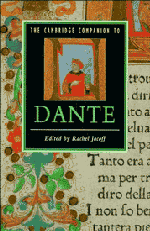Book contents
- Frontmatter
- 1 Life of Dante
- 2 Dante and the lyric past
- 3 Approaching the Vita nuova
- 4 The unfinished author
- 5 Dante and the empire
- 6 Dante and Florence
- 7 Dante and the classical poets
- 8 Dante and the Bible
- 9 The theology of Dante
- 10 A poetics of chaos and harmony
- 11 Introduction to Inferno
- 12 Introduction to Purgatorio
- 13 "Shadowy prefaces"
- 14 Dante and his commentators
- 15 Dante in English
- Further reading
- Index
5 - Dante and the empire
Published online by Cambridge University Press: 28 May 2006
- Frontmatter
- 1 Life of Dante
- 2 Dante and the lyric past
- 3 Approaching the Vita nuova
- 4 The unfinished author
- 5 Dante and the empire
- 6 Dante and Florence
- 7 Dante and the classical poets
- 8 Dante and the Bible
- 9 The theology of Dante
- 10 A poetics of chaos and harmony
- 11 Introduction to Inferno
- 12 Introduction to Purgatorio
- 13 "Shadowy prefaces"
- 14 Dante and his commentators
- 15 Dante in English
- Further reading
- Index
Summary
IN HIS BRILLIANT little book Dante as a Political Thinker, published forty years ago but arguably still the most stimulating introduction to the subject in English, my old teacher Alessandro Passerin d'Entrèves assigns to Dante's theory of the empire only a limited place. D'Entrèves emphasizes Dante's preoccupation with his Florentine “patria” and the church, as well as his cultural patriotism, while denying his political nationalism. Dante was therefore in the tradition of his family essentially a loyal “Guelf,” even if a troubled one as the Commedia shows (a work begun, d'Entrèves believes, after the collapse in 1313 of Emperor Henry VII's Italian expedition). Dante's “Ghibellinism,” his advocacy of the imperial cause, was an important but passing phase in the evolution of his thought. His treatise on the empire, Monarchia, which d'Entreves dates as c. 1312, was an aberration, indicating how he had been overcome by the hope that a human saviour could take away the sins of the world, forgetting the fundamental Christian idea that from within, and not from without, must mankind be redeemed and saved. D'Entrèves believes that the Commedia was written after the Monarchia and marks a return to a more orthodox view of salvation.
- Type
- Chapter
- Information
- The Cambridge Companion to Dante , pp. 67 - 79Publisher: Cambridge University PressPrint publication year: 1993
- 3
- Cited by



